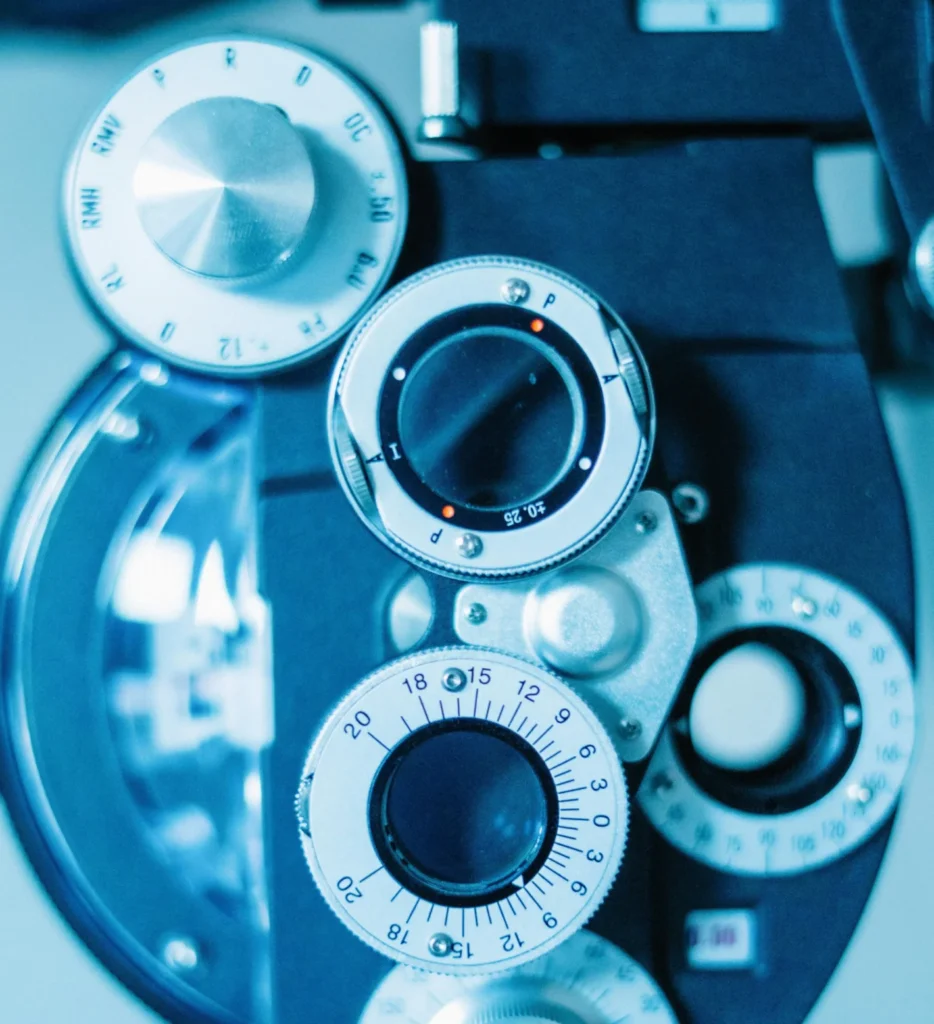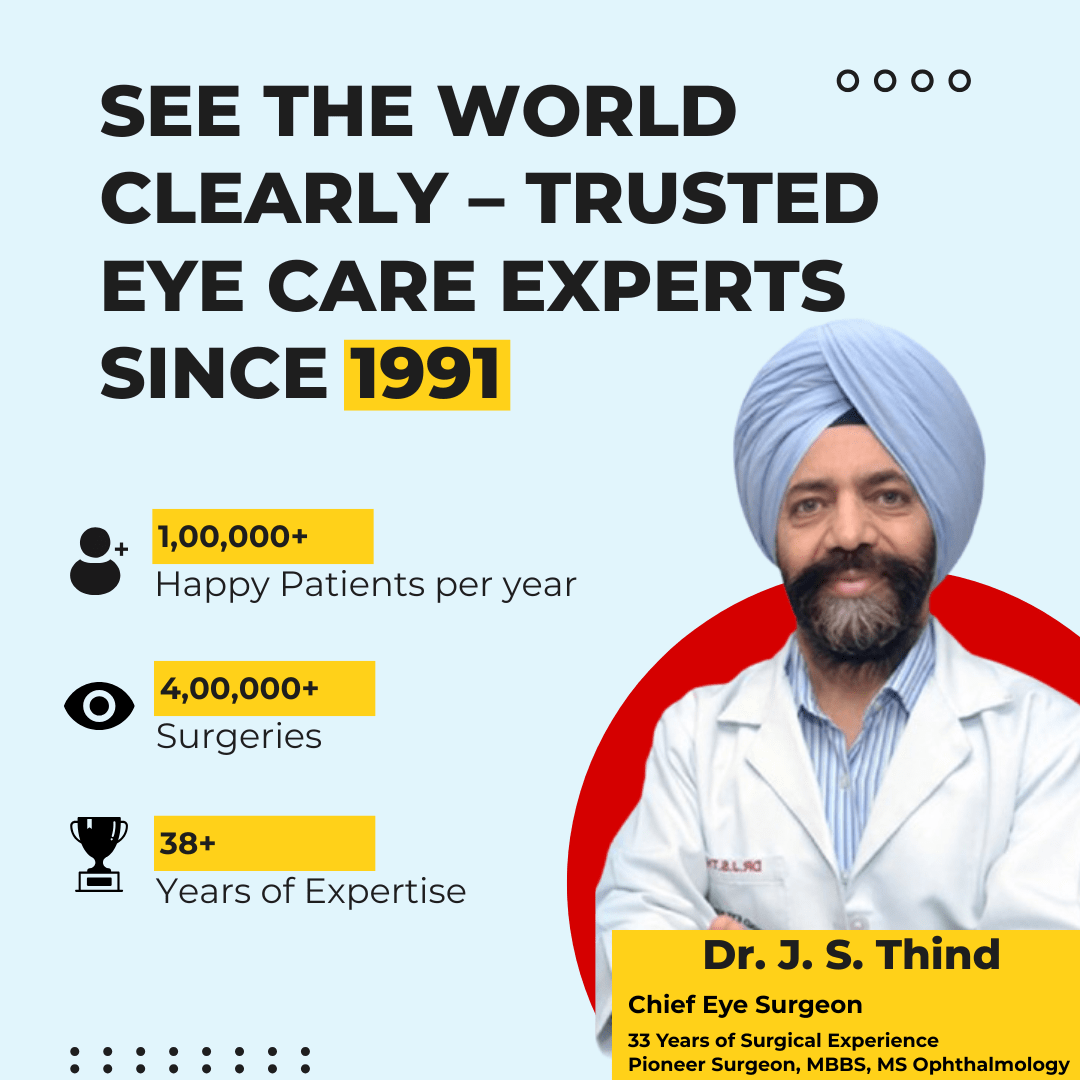Blurry, cloudy, or faded vision is often an early sign of cataracts, one of the most common yet treatable eye conditions. If you’re seeking safe and effective cataract surgery in Jalandhar, you’re in the right place.
At Thind Eye Hospital, Punjab’s NABH-accredited super specialty eye care center, patients receive advanced cataract care in Punjab with cutting-edge technology, experienced surgeons, and compassionate care. Led by Dr. Jaswant Singh Thind, one of the best cataract surgeons in Jalandhar, the hospital has been restoring clear vision for thousands since 1991.
This guide explains everything you need to know about cataract treatment, including procedure types, benefits, and the cataract operation cost in Jalandhar, so you can make an informed decision for your eyes.

What Is a Cataract?
A cataract occurs when the natural lens of the eye becomes cloudy, leading to blurry or dim vision. It’s a gradual process, often related to aging, prolonged UV exposure, or medical conditions like diabetes.
Common symptoms include:
- Blurred or double vision
- Faded colors or poor night vision
- Sensitivity to bright light or glare
- Frequent changes in eyeglass prescription
If you’re experiencing any of these signs, it may be time to consult the best cataract surgeon in Jalandhar for an expert diagnosis and treatment plan.
Modern Cataract Surgery in Jalandhar
Cataract surgery is one of the safest and most successful procedures in modern ophthalmology. At Thind Eye Hospital, cataract surgery in Jalandhar is performed using advanced laser and micro-incision techniques, ensuring precision and quick recovery.
Types of Cataract Surgery Available:
- Phacoemulsification (Phaco Surgery): A small ultrasonic probe breaks and removes the cloudy lens, followed by lens replacement with an intraocular lens (IOL).
- Phacoemulsification (Phaco Surgery): A small ultrasonic probe breaks and removes the cloudy lens, followed by lens replacement with an intraocular lens (IOL).
- Femtosecond Laser-Assisted Cataract Surgery (FLACS): A completely blade-free cataract procedure, performed with laser accuracy for higher precision and safety.
- Femtosecond Laser-Assisted Cataract Surgery (FLACS): A completely blade-free cataract procedure, performed with laser accuracy for higher precision and safety.
- Microincision Cataract Surgery (MICS): Involves even smaller incisions (less than 2 mm), promoting faster healing and minimal discomfort.
- Microincision Cataract Surgery (MICS): Involves even smaller incisions (less than 2 mm), promoting faster healing and minimal discomfort.
The hospital’s focus on innovation and safety makes it a trusted destination for advanced cataract care in Punjab.
Why Choose Thind Eye Hospital for Cataract Surgery in Jalandhar
1. Expertise That Inspires Trust
Dr. Jaswant Singh Thind, Chief Eye Surgeon and hospital founder, brings over 38 years of surgical experience and is recognized for performing the highest number of cataract surgeries in Punjab. His precision and patient-first approach make him the best cataract surgeon in Jalandhar.
2. Cutting-Edge Technology
The hospital is equipped with:
- Phaco & Femtosecond Laser systems for 100% blade-free procedures
- Advanced intraocular lenses (Monofocal, Multifocal, and Toric IOLs)
- High-resolution optical imaging for pre-surgical planning
This blend of skill and innovation ensures every cataract surgery in Jalandhar is safe, quick, and effective.
3. NABH Accreditation & International Recognition: Thind Eye Hospital adheres to the highest quality standards and is recognized among the Top 10 Eye Hospitals in India by ICHA.
4. Personalized Patient Care: Every patient receives individualized treatment plans, pre-surgery counseling, and detailed aftercare support.
5. Convenient and Affordable: Patients from Punjab and beyond choose Thind Eye Hospital not just for excellence, but for transparency in the cataract operation cost in Jalandhar.
Cataract Operation Cost in Jalandhar
The cataract operation cost in Jalandhar varies depending on several factors, such as:
- Type of intraocular lens (Monofocal, Multifocal, or Premium IOL)
- Technology used (Phaco or Laser-Assisted)
- Surgeon’s experience and hospital facilities
- Surgeon’s experience and hospital facilities
At Thind Eye Hospital, the pricing is transparent and value-driven, offering affordable packages without compromising on care. The team discusses all cost details before surgery so patients can make confident, informed choices.
Benefits of Advanced Cataract Surgery
Patients choosing Thind Eye Hospital for cataract surgery in Jalandhar enjoy:
- Painless, stitch-less procedure
- Quick 10–15 minute surgery
- No hospital stay required
- Fast recovery with same-day discharge
- Crystal-clear, glare-free vision
- Long-lasting lens implants
- Long-lasting lens implants
Modern technology ensures safety and comfort while restoring your vision, making Thind Eye Hospital a hub for advanced cataract care in Punjab.
What to Expect Before and After Surgery
Before Surgery:
- A detailed eye examination
- Lens measurement and corneal mapping
- Discussion about IOL options
- Discussion about IOL options
After Surgery:
- Use prescribed eye drops regularly
- Avoid eye rubbing or strenuous activity for a week
- Attend follow-up appointments for progress monitoring
Most patients notice improved vision within 24–48 hours after surgery.
Why Early Treatment Matters
Delaying cataract surgery can lead to reduced vision quality and increased surgical difficulty. Choosing timely cataract surgery in Jalandhar ensures safer outcomes and prevents long-term complications.
Conclusion
Choosing cataract surgery in Jalandhar at Thind Eye Hospital means choosing clarity, comfort, and confidence. With decades of expertise, world-class equipment, and a compassionate approach, Dr. Jaswant Singh Thind and his team continue to lead in advanced cataract care in Punjab.
Whether you’re concerned about blurry vision or exploring treatment options, consult the best cataract surgeon in Jalandhar today and experience life in clear focus again.
FAQs on Cataract Surgery in Jalandhar
Dr. Jaswant Singh Thind, Chief Eye Surgeon at Thind Eye Hospital, is widely regarded as the best cataract surgeon in Jalandhar with over 38 years of experience.
The cost depends on the type of lens and technology used. Thind Eye Hospital provides transparent and affordable pricing for all cataract procedures.
No. Modern cataract surgery is painless and performed under topical anesthesia with minimal recovery time.
Its NABH accreditation, advanced laser technology, and expert surgeons make it the most trusted destination for advanced cataract care in Punjab.
Most patients notice improved vision within one to two days and achieve full recovery within a week.
Usually, the surgeries are performed a few days apart for optimal healing and safety.


